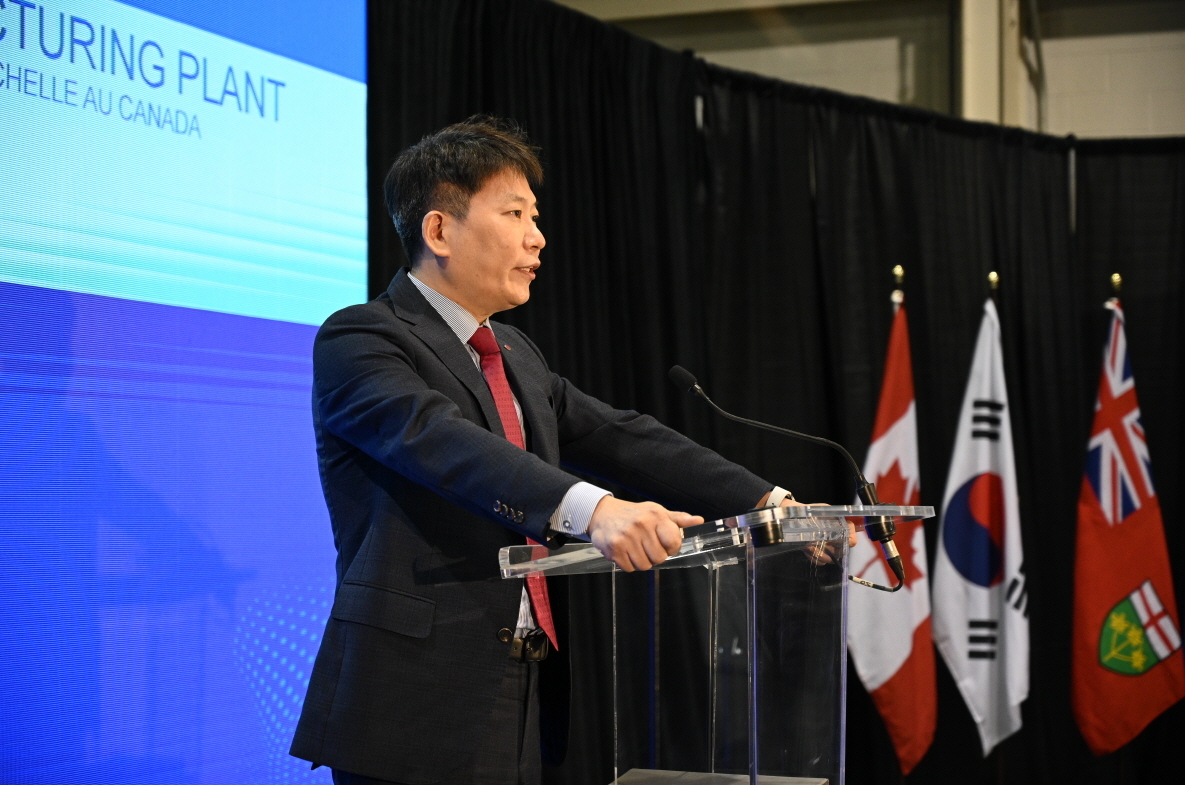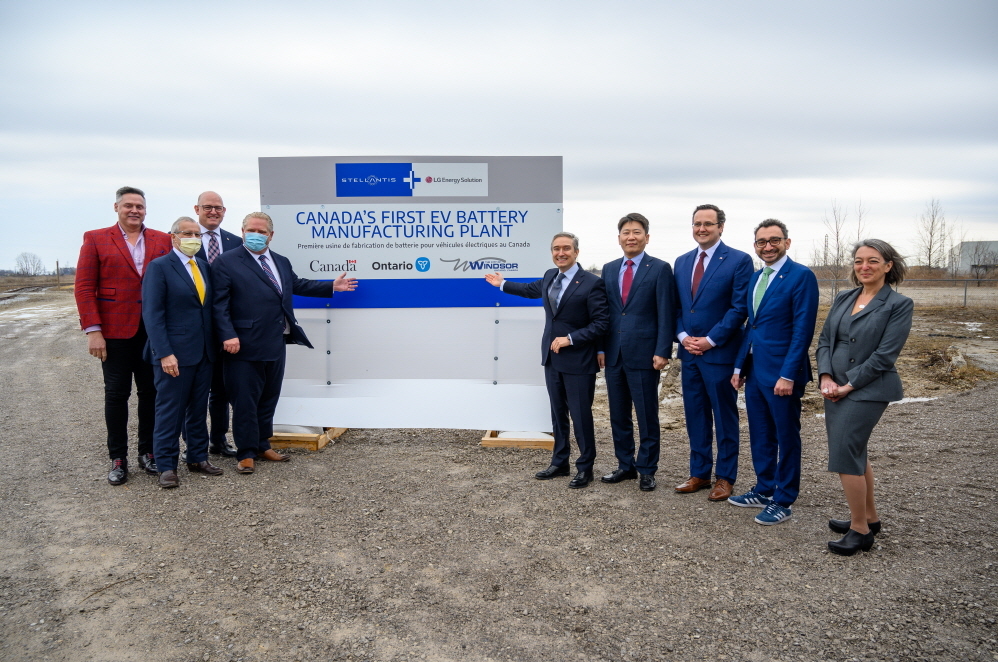LG Energy Solution commits $2b for North America expansion
LG Energy Solution unveils JV with Stellantis in Canada, 1st cylindrical battery plant in US
By Son Ji-hyoungPublished : March 24, 2022 - 14:45

South Korea’s battery maker LG Energy Solution on Thursday announced plans to build a 4.8 trillion-won ($4.1 billion) lithium-ion battery plant in Ontario, Canada with carmaker Stellantis and a 1.7 trillion-won cylindrical battery plant in Arizona, a first of its kind in the United States.
To support the plan, LG Energy Solution approved a combined capital commitment of $2 billion over the course of the construction, which gained board approval Wednesday, showed filings with the Financial Supervisory Service.
LG signed a binding agreement with Stellantis, which owns car brands such as Dodge, Maserati, Fiat, Chrysler, Citroen and Peugeot, for an electric vehicle battery manufacturing facility in Windsor, Ontario, home to Canada’s largest automotive cluster.
The battery arm of Korea’s fourth-largest conglomerate will hold a 51 percent stake in the new joint venture.
The new plant, with an annual production capacity of over 45 gigawatt-hours to make lithium-ion battery cells and modules, is poised for construction beginning later this year and for operations starting in the first quarter of 2024. Some 2,500 new jobs are anticipated in the area.
The news will be critical to “creating new jobs and putting Canada on the cutting edge of the clean economy,” said Canada’s Prime Minister Justin Trudeau.
On the same day, LG Energy Solution announced plans to invest 1.7 trillion won to build its own cylindrical lithium-ion battery factory in Queen Creek, Arizona. The 11 gigawatt-hour facility anticipates a mass production in the second half of 2024, as its construction is set to begin in the second half of 2022.
The South Korean company said it aims to target EV startups using cylindrical batteries in the US and meet demand for cylindrical-type batteries for electric tools.
Cylindrical battery cells are one of the three main form factors of the lithium-ion batteries, along with prismatic cells and pouch cells. Cylindrical cells tend to be more resistant to internal pressures than the other two, but take up more space than pouch-type cells.
To support the plan, LG Energy Solution approved a combined capital commitment of $2 billion over the course of the construction, which gained board approval Wednesday, showed filings with the Financial Supervisory Service.
LG signed a binding agreement with Stellantis, which owns car brands such as Dodge, Maserati, Fiat, Chrysler, Citroen and Peugeot, for an electric vehicle battery manufacturing facility in Windsor, Ontario, home to Canada’s largest automotive cluster.
The battery arm of Korea’s fourth-largest conglomerate will hold a 51 percent stake in the new joint venture.
The new plant, with an annual production capacity of over 45 gigawatt-hours to make lithium-ion battery cells and modules, is poised for construction beginning later this year and for operations starting in the first quarter of 2024. Some 2,500 new jobs are anticipated in the area.
The news will be critical to “creating new jobs and putting Canada on the cutting edge of the clean economy,” said Canada’s Prime Minister Justin Trudeau.
On the same day, LG Energy Solution announced plans to invest 1.7 trillion won to build its own cylindrical lithium-ion battery factory in Queen Creek, Arizona. The 11 gigawatt-hour facility anticipates a mass production in the second half of 2024, as its construction is set to begin in the second half of 2022.
The South Korean company said it aims to target EV startups using cylindrical batteries in the US and meet demand for cylindrical-type batteries for electric tools.
Cylindrical battery cells are one of the three main form factors of the lithium-ion batteries, along with prismatic cells and pouch cells. Cylindrical cells tend to be more resistant to internal pressures than the other two, but take up more space than pouch-type cells.

These are part of LG Energy Solution’s pledge to invest $4.6 billion into battery facilities in North America, securing production capacity of over 200 gigawatt hours in North America annually to power 2.5 million high performance all-electric vehicles, which can run more than 500 kilometers on a single charge.
This is also in line with the US state support for wider penetration of electric vehicles across the nation, LG Energy Solution said. The Joe Biden administration aims to provide financial incentives so that half of commercial cars produced annually will be powered by new and renewable energy by 2030.
The US also plans to inject $5 billion in five years to add 500,000 car battery-charging stations as part of the $1 trillion US infrastructure bill approved by the US Congress in November.
So far, LG Energy Solution has operated a 5 gigawatt-hour battery plant in Michigan since 2012.
Its Michigan plant has won local state approval Tuesday to quintuple the production capacity beginning 2025, with a $1.7 billion capital investment to create 1,200 jobs.
Moreover, LG is on the course to build three plants across the US in Ohio, Tennessee and Michigan by partnering with General Motors, with the annual capacity of at least 120 gigawatt-hours combined. Its Ohio facility aims to go online starting the second half of this year, being the first to be operational out of the three under the LG-GM joint venture Ultium Cells.
The North America is estimated to generate a combined 286 gigawatt-hours of electric vehicle batteries in 2025 across the region, up sevenfold from 2021, according to market intelligence IHS Markit.
In addition, LG Energy Solution is targeting a completion of a 100 gigawatt-hour facility in Poland by 2025, a 110 gigawatt-hour plant in Nanjing, China by 2025 and a 22 gigawatt-hour line in North Chungcheong Province in its home country. Its joint venture with domestic auto giant Hyundai Motor targets a mass production of batteries with 10 gigawatt-hours of annual capacity in Indonesia beginning 2024.
Shares of LG Energy Solution edged up 0.25 percent on the Korea Exchange Thursday.
(consnow@heraldcorp.com)
This is also in line with the US state support for wider penetration of electric vehicles across the nation, LG Energy Solution said. The Joe Biden administration aims to provide financial incentives so that half of commercial cars produced annually will be powered by new and renewable energy by 2030.
The US also plans to inject $5 billion in five years to add 500,000 car battery-charging stations as part of the $1 trillion US infrastructure bill approved by the US Congress in November.
So far, LG Energy Solution has operated a 5 gigawatt-hour battery plant in Michigan since 2012.
Its Michigan plant has won local state approval Tuesday to quintuple the production capacity beginning 2025, with a $1.7 billion capital investment to create 1,200 jobs.
Moreover, LG is on the course to build three plants across the US in Ohio, Tennessee and Michigan by partnering with General Motors, with the annual capacity of at least 120 gigawatt-hours combined. Its Ohio facility aims to go online starting the second half of this year, being the first to be operational out of the three under the LG-GM joint venture Ultium Cells.
The North America is estimated to generate a combined 286 gigawatt-hours of electric vehicle batteries in 2025 across the region, up sevenfold from 2021, according to market intelligence IHS Markit.
In addition, LG Energy Solution is targeting a completion of a 100 gigawatt-hour facility in Poland by 2025, a 110 gigawatt-hour plant in Nanjing, China by 2025 and a 22 gigawatt-hour line in North Chungcheong Province in its home country. Its joint venture with domestic auto giant Hyundai Motor targets a mass production of batteries with 10 gigawatt-hours of annual capacity in Indonesia beginning 2024.
Shares of LG Energy Solution edged up 0.25 percent on the Korea Exchange Thursday.
(consnow@heraldcorp.com)








![[Graphic News] More Koreans say they plan long-distance trips this year](http://res.heraldm.com/phpwas/restmb_idxmake.php?idx=644&simg=/content/image/2024/04/17/20240417050828_0.gif&u=)
![[KH Explains] Hyundai's full hybrid edge to pay off amid slow transition to pure EVs](http://res.heraldm.com/phpwas/restmb_idxmake.php?idx=644&simg=/content/image/2024/04/18/20240418050645_0.jpg&u=20240419100350)






![[From the Scene] Monks, Buddhists hail return of remains of Buddhas](http://res.heraldm.com/phpwas/restmb_idxmake.php?idx=652&simg=/content/image/2024/04/19/20240419050617_0.jpg&u=20240419175937)

![[KH Explains] Hyundai's full hybrid edge to pay off amid slow transition to pure EVs](http://res.heraldm.com/phpwas/restmb_idxmake.php?idx=652&simg=/content/image/2024/04/18/20240418050645_0.jpg&u=20240419100350)

![[Today’s K-pop] Illit drops debut single remix](http://res.heraldm.com/phpwas/restmb_idxmake.php?idx=642&simg=/content/image/2024/04/19/20240419050612_0.jpg&u=)